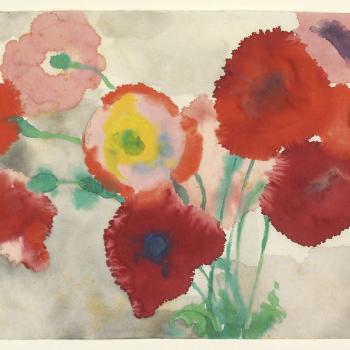And God said, Let the waters bring forth abundantly the
moving creature that hath life, and fowl that may fly above
the earth in the open firmament of heaven. And God created
great whales, and every living creature that moveth, which
the waters brought forth abundantly, after their kind, and
every winged fowl after his kind: and God saw that it was
good. (Gen. 1:20)
The word abundant stands out in this passage. Abundance not only describes the life in the sea, but it also applies to the inexhaustibility of faith. Faith is more abundant than all the fish in the seas and all the fowl in the heavens. With this metaphor, I not only think about what abundance means but also build on the image by imagining endless numbers of fish swimming in schools and darting around objects effortlessly. If I tried to stop the flow of fish or catch them with my hands, they would just swim around me and reassemble on the other side, as if nothing had happened. Likewise, faith flows through our lives, but we can never grab it, direct it, or contain it.
I have found many other metaphors for faith in Genesis 1; they will be discussed in detail in as I address Genesis 1. Genesis uses the six days of creation to organize these metaphors for faith. It uses things found in nature as perfect symbols of faith. We find at the end of the creation week that the ultimate metaphor for faith is rest on the seventh day. Genesis 1 may be a factual account of creation, but to me, the important message is that it tells me what faith can mean.
The next two stories—the garden of Eden and Cain and Abel—tell us why we don't readily experience faith in our lives and why we experience so much suffering. These tales tell us that we are blessed with both faith and self-will, or wisdom, to help us deal with life and that they are meant to work together. If we choose to rely solely on our own wisdom, ignoring faith, we will suffer. We see this play out when Adam and Eve are at the tree of the knowledge of good and evil. At the tree, Eve reasons:
And when the woman saw that the tree was good for food,
and that it was pleasant to the eyes, and a tree to be desired
to make one wise, she took of the fruit thereof, and did eat,
and gave also unto her husband with her; and he did eat.
(Gen. 3:6)
Eve relied on her own wisdom and reasoning, rather than having faith in what God told her not to do. This marks the moment when Adam and Eve lost their faith. From that instant, they began to suffer. With these stories, the Bible is telling us that everyone will lose his or her faith; it is a normal occurrence in human life. But Genesis 1–11 does not leave us to forever suffer the loss of faith; it gives us the solution. The very next story about Noah gives us the answer or the prescription for how to get faith back in our lives. Noah's story gives us a practical method to reinvigorate our faith. In fact, Noah's story is the central message of Genesis 1–11, and to fully embrace the meanings of the metaphors of the ark and the flood is to fully embrace faith. Finally, the stories of Noah's nakedness and the Tower of Babel end the primeval history by telling us how to put faith into action.
The stories of Genesis 1–11 need to be examined repeatedly, not just read repeatedly. Each time we read them through, more metaphors will appear, allowing a deeper understanding of and connection with each story, a connection that we can apply to our lives today to experience faith. If we commit ourselves enough, we will be 'Abel' to enjoy faith working in our lives, giving us great comfort, peace, and rest.
All God wants of man is a gift of a peaceful heart.
— Meister Eckhart (1260–c. 1328)




